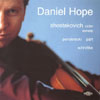Shostakovich Violin Sonata etc
There are fine alternatives to the main works here, yet the imaginative programme and superb recorded sound are ample recommendation for the present version
View record and artist detailsRecord and Artist Details
Composer or Director: Alfred Schnittke, Dmitri Shostakovich, Arvo Pärt, Krzysztof Penderecki
Label: Nimbus
Magazine Review Date: 4/2000
Media Format: CD or Download
Media Runtime: 77
Mastering:
DDD
Catalogue Number: NI5631

Tracks:
| Composition | Artist Credit |
|---|---|
| Spiegel im Spiegel |
Arvo Pärt, Composer
Arvo Pärt, Composer Daniel Hope, Violin Simon Mulligan, Piano |
| Cadenza |
Krzysztof Penderecki, Composer
Daniel Hope, Violin Krzysztof Penderecki, Composer |
| Sonata for Violin and Piano No. 3 |
Alfred Schnittke, Composer
Alfred Schnittke, Composer Daniel Hope, Violin Simon Mulligan, Piano |
| Stille Nacht |
Alfred Schnittke, Composer
Alfred Schnittke, Composer Daniel Hope, Violin Simon Mulligan, Piano |
| Sonata for Violin and Piano |
Dmitri Shostakovich, Composer
Daniel Hope, Violin Dmitri Shostakovich, Composer Simon Mulligan, Piano |
Author: Arnold Whittall
It's good to find Daniel Hope continuing the all-20th-century commitment of his impressive debut disc (5/99). After the satisfyingly complementary contrasts offered by Takemitsu, Schnittke and Weill, this new programme has a narrower focus. Yet it still makes for absorbing listening, and the Nimbus recording is of outstanding quality, with just the right degree of space around the sound, and an ideal balance between Hope and his excellent partner, Simon Mulligan, whose name is unjustly omitted from the booklet cover.
The two sonatas both count as late works. The Shostakovich, at 36 minutes, is built on a symphonic scale and exposes the full intensity of the composer's characteristic blend of lament and danse macabre. The sonata's steady dramatic evolution is superbly sustained in this performance, and although the early stages of the long finale hint at some loss of compositional concentration, the build-up to the central pair of cadenzas is electrifying. Schnittke's Third Sonata is half the length, and has much of that enigmatic understatement which has led some authorities to compare his late works unfavourably with their predecessors. David Fanning, reviewing the recording by Mark Lubotsky and Irene Schnittke (Ondine, 10/97), found only 'unselfcritical inconsequentiality' in this piece: yet for me the contrast between the strangely gentle lyricism of the second movement and the dark drama of the brief finale is as haunting and idiosyncratic as anything Schnittke ever wrote.
I'm no devotee of Part's prolonged arpeggiated doodling, and Hope's scrupulous observance of the composer's wish for a cool and unsentimental tone can't save Spiegel im Spiegel from projecting the full weight of its own inertia. But Penderecki's Cadenza has a welcome austerity and asperity, and there's a blistering final track with Schnittke's familiar Stille Nacht, in which Hope and Mulligan make great play with the composer's own perception of it as a (relatively) lighthearted depiction of a broken-down musical box.
There are authoritative alternatives to the main works included here, not least the historic Oistrakh/Richter account of the Shostakovich. But no other disc offers this thought-provoking collection of compositions, or such superior recorded sound. It is highly recommended.'
The two sonatas both count as late works. The Shostakovich, at 36 minutes, is built on a symphonic scale and exposes the full intensity of the composer's characteristic blend of lament and danse macabre. The sonata's steady dramatic evolution is superbly sustained in this performance, and although the early stages of the long finale hint at some loss of compositional concentration, the build-up to the central pair of cadenzas is electrifying. Schnittke's Third Sonata is half the length, and has much of that enigmatic understatement which has led some authorities to compare his late works unfavourably with their predecessors. David Fanning, reviewing the recording by Mark Lubotsky and Irene Schnittke (Ondine, 10/97), found only 'unselfcritical inconsequentiality' in this piece: yet for me the contrast between the strangely gentle lyricism of the second movement and the dark drama of the brief finale is as haunting and idiosyncratic as anything Schnittke ever wrote.
I'm no devotee of Part's prolonged arpeggiated doodling, and Hope's scrupulous observance of the composer's wish for a cool and unsentimental tone can't save Spiegel im Spiegel from projecting the full weight of its own inertia. But Penderecki's Cadenza has a welcome austerity and asperity, and there's a blistering final track with Schnittke's familiar Stille Nacht, in which Hope and Mulligan make great play with the composer's own perception of it as a (relatively) lighthearted depiction of a broken-down musical box.
There are authoritative alternatives to the main works included here, not least the historic Oistrakh/Richter account of the Shostakovich. But no other disc offers this thought-provoking collection of compositions, or such superior recorded sound. It is highly recommended.'
Discover the world's largest classical music catalogue with Presto Music.

Gramophone Digital Club
- Digital Edition
- Digital Archive
- Reviews Database
- Full website access
From £8.75 / month
Subscribe
Gramophone Full Club
- Print Edition
- Digital Edition
- Digital Archive
- Reviews Database
- Full website access
From £11.00 / month
Subscribe
If you are a library, university or other organisation that would be interested in an institutional subscription to Gramophone please click here for further information.




